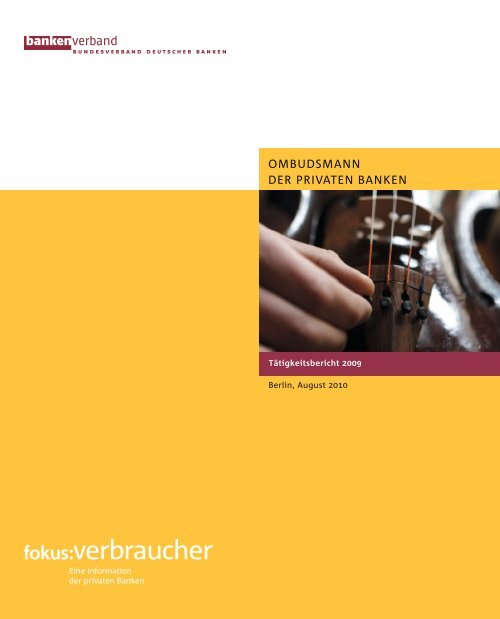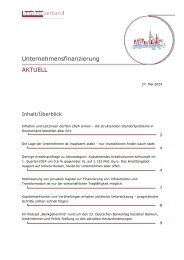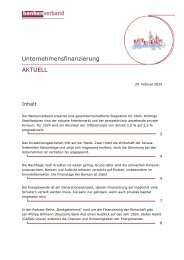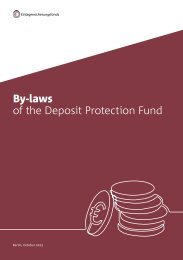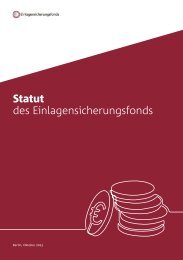Summary of the Ombudsman's Report 2009
To settle disputes between banks and their customers as quickly and smoothly as possible, Germany's private commercial banks introduced an out-of-court conciliation procedure as early as 1992.
To settle disputes between banks and their customers as quickly and smoothly as possible, Germany's private commercial banks introduced an out-of-court conciliation procedure as early as 1992.
You also want an ePaper? Increase the reach of your titles
YUMPU automatically turns print PDFs into web optimized ePapers that Google loves.
Ombudsmann<br />
der privaten Banken<br />
Tätigkeitsbericht <strong>2009</strong><br />
Berlin, August 2010
106 ombudsmann der privaten banken – tätigkeitsbericht <strong>2009</strong><br />
7 <strong>Summary</strong> <strong>of</strong> <strong>the</strong> Ombudsman’s <strong>Report</strong> <strong>2009</strong><br />
To settle disputes between banks and <strong>the</strong>ir customers as<br />
quickly and smoothly as possible, Germany’s private commercial<br />
banks introduced an out-<strong>of</strong>-court conciliation procedure<br />
as early as 1992: <strong>the</strong> Ombudsman Scheme. The Ombudsman<br />
Scheme is <strong>the</strong> centrepiece <strong>of</strong> <strong>the</strong> private commercial banks’<br />
overall consumer policy scheme, which rests on four pillars:<br />
consumer education, consumer information, contract transparency<br />
and out-<strong>of</strong>-court dispute-resolution facilities.<br />
1. The Ombudsman Scheme<br />
under <strong>the</strong> statutory limitation period during <strong>the</strong> ombudsman<br />
proceedings. If <strong>the</strong>ir complaint to <strong>the</strong> ombudsman is upheld,<br />
<strong>the</strong>y obtain redress quickly and easily. The private commercial<br />
banks have undertaken to accept ombudsman decisions in<br />
disputes involving amounts up to €5,000. This binding effect<br />
<strong>of</strong> ombudsman decisions should not be taken for granted; it is<br />
not standard practice in dispute-resolution schemes operated<br />
by <strong>the</strong> business sector on a voluntary basis. Experience has<br />
shown that banks <strong>of</strong>ten accept ombudsman decisions against<br />
<strong>the</strong>m even where disputes involve amounts exceeding €5,000.<br />
a. Out-<strong>of</strong>-court dispute resolution<br />
As an alternative to <strong>the</strong> <strong>of</strong>ten inconvenient, time-consuming<br />
and expensive option <strong>of</strong> legal action, Germany’s private commercial<br />
banks <strong>of</strong>fer <strong>the</strong>ir customers a widely accepted, effective<br />
procedure whereby disputes are resolved unbureaucrati -<br />
c ally and quickly by an independent, impartial person – an<br />
ombudsman. The Ombudsman Scheme is designed primarily<br />
for consumers, but it is also open to firms and pr<strong>of</strong>essionals to<br />
handle disputes about credit transfers or misuse <strong>of</strong> payment<br />
cards. Details <strong>of</strong> how <strong>the</strong> scheme works are set out in <strong>the</strong> Rules<br />
<strong>of</strong> Procedure approved by <strong>the</strong> Federal Ministry <strong>of</strong> Justice for<br />
<strong>the</strong> settlement <strong>of</strong> customer complaints in <strong>the</strong> German private<br />
commercial banking sector, which are printed in <strong>the</strong> Appendix<br />
to <strong>the</strong> Ombudsman’s <strong>Report</strong>.<br />
The benefits <strong>of</strong> this modern dispute-resolution scheme are<br />
obvious: <strong>the</strong> scheme is free <strong>of</strong> charge to bank customers<br />
and does not involve any risks for <strong>the</strong>m. If <strong>the</strong>y do not accept<br />
<strong>the</strong> ombudsman’s decision, <strong>the</strong>y are still free to go to a<br />
court <strong>of</strong> law. They cannot lose out by forfeiting <strong>the</strong>ir claims<br />
b. The ombudsmen<br />
The high level <strong>of</strong> public acceptance that <strong>the</strong> private commercial<br />
banks’ Ombudsman Scheme enjoys is due, to a great<br />
extent, to <strong>the</strong> quality <strong>of</strong> <strong>the</strong> ombudsmen <strong>the</strong>mselves. These are<br />
former senior judges or legal pr<strong>of</strong>essionals whose personality<br />
and proven expertise ensure impartial proceedings:<br />
• Ekkehard Bombe, former judge at <strong>the</strong> Constitutional<br />
Court <strong>of</strong> Hesse and president <strong>of</strong> Wiesbaden Regional Court<br />
• Horst-Die<strong>the</strong>r Hensen, former vice-president <strong>of</strong> <strong>the</strong><br />
Hanseatic Higher Regional Court, Hamburg<br />
• Dr Gerda Müller, former vice-president and presiding<br />
judge at <strong>the</strong> Federal Supreme Court<br />
• Dr Gerhart Kreft, former presiding judge at <strong>the</strong> Federal<br />
Supreme Court<br />
• Werner Weiß, former senior justice ministry <strong>of</strong>ficial<br />
in Bavaria and presiding judge at <strong>the</strong> Munich Higher<br />
Regional Court.
ankenverband 107<br />
c. Management <strong>of</strong> complaints<br />
A Customer Complaints Office was set up at <strong>the</strong> Association <strong>of</strong><br />
German Banks as a gateway to <strong>the</strong> Ombudsman Scheme. Any<br />
customer <strong>of</strong> a private commercial bank can contact this <strong>of</strong>fice in<br />
writing if <strong>the</strong>y feel that <strong>the</strong>y have been treated unfairly by <strong>the</strong>ir<br />
bank. All <strong>the</strong>y have to do is give a brief account <strong>of</strong> <strong>the</strong> facts <strong>of</strong><br />
<strong>the</strong> matter, enclosing copies <strong>of</strong> <strong>the</strong> required documents (e.g.<br />
cash account or securities account statements). Complaints in<br />
English and French submitted by customers resident abroad<br />
are also processed; in this case, however, <strong>the</strong> ombudsman<br />
proceedings can take longer, as translations may be required.<br />
A fully intended consequence <strong>of</strong> <strong>the</strong> introduction <strong>of</strong> <strong>the</strong><br />
Ombudsman Scheme is that most private commercial banks<br />
have set up schemes <strong>of</strong> <strong>the</strong>ir own to handle customer complaints.<br />
These in-house complaint-settlement schemes have<br />
been a success. A large number <strong>of</strong> complaints do not need to<br />
be settled by an ombudsman. In many cases, simply explaining<br />
banking procedures or complex, abstract banking transactions<br />
takes care <strong>of</strong> any disputes in advance.
108 ombudsmann der privaten banken – tätigkeitsbericht <strong>2009</strong><br />
2. Statistics<br />
a. Number and outcome <strong>of</strong> complaints<br />
The failure <strong>of</strong> Lehman Bro<strong>the</strong>rs on 15 September 2008<br />
triggered a rise in <strong>the</strong> number <strong>of</strong> complaints from <strong>the</strong> fourth<br />
quarter <strong>of</strong> 2008 onwards, which continued throughout <strong>2009</strong>.<br />
At <strong>the</strong> end <strong>of</strong> <strong>the</strong> year, <strong>the</strong> number <strong>of</strong> complaints received<br />
totalled over 6,500. This was an increase <strong>of</strong> around 35% compared<br />
with 2008.<br />
In addition, around 2,400 complaints against non-members<br />
were received during this period and forwarded to <strong>the</strong> relevant<br />
dispute-settlement bodies.<br />
As <strong>the</strong> above table shows, 1,005 complaints in <strong>2009</strong> were not<br />
followed up by <strong>the</strong> complainants and thus did not require an<br />
ombudsman decision. Over 800 <strong>of</strong> <strong>the</strong> complaints received<br />
in <strong>2009</strong> were inadmissible under <strong>the</strong> Ombudsman Scheme.<br />
In some <strong>of</strong> <strong>the</strong>se cases, <strong>the</strong> complainants were not, for example,<br />
consumers or not <strong>the</strong>mselves customers <strong>of</strong> <strong>the</strong> bank<br />
concerned. Such cases involved, for instance, complaints by<br />
customers that money remitted by <strong>the</strong>m was credited to a<br />
different account at <strong>the</strong> payee bank than that specified in <strong>the</strong>ir<br />
instructions. In accordance with Section 4 (4) sentence 3 <strong>of</strong> <strong>the</strong><br />
Rules <strong>of</strong> Procedure for <strong>the</strong> Ombudsman Scheme, ombudsmen<br />
proceedings were not possible in over 500 <strong>of</strong> <strong>the</strong> inadmissible<br />
cases as evidence could not be provided through <strong>the</strong> presentation<br />
<strong>of</strong> documents, and <strong>the</strong> hearing <strong>of</strong> witnesses would have<br />
been necessary to settle <strong>the</strong> complaint.<br />
Taking into account all <strong>the</strong> cases already closed, just about<br />
60% <strong>of</strong> <strong>the</strong> complaints admissible under <strong>the</strong> Ombudsman<br />
Scheme were resolved in favour <strong>of</strong> customers or settled on<br />
an amicable basis. Often simply explaining banking procedures<br />
or complex, abstract banking transactions resolve disputes<br />
in advance.<br />
Where banks examined a customer’s complaint internally and<br />
found it to be legitimate, <strong>the</strong>y <strong>of</strong>ten provided redress without<br />
referring <strong>the</strong> complaint to <strong>the</strong> Ombudsman Scheme. Banks<br />
also settled some <strong>of</strong> <strong>the</strong>se complaints on a goodwill basis. In<br />
169 cases, <strong>the</strong> ombudsman proposed a compromise agreement<br />
between <strong>the</strong> parties to settle <strong>the</strong> complaint. Just under<br />
40% <strong>of</strong> <strong>the</strong> admissible complaints were settled in favour <strong>of</strong><br />
banks.<br />
Since almost 1,000 complaints were still being processed when<br />
<strong>the</strong> Ombudsman’s <strong>Report</strong> <strong>2009</strong> was published, a marked shift<br />
in <strong>the</strong> outcome <strong>of</strong> complaints in favour <strong>of</strong> customers is currently<br />
indicated. The outcome <strong>of</strong> complaints has been relatively<br />
evenly balanced during <strong>the</strong> past five years, how ever, with usually<br />
just over 50% <strong>of</strong> complaints being resolved in favour <strong>of</strong><br />
customers. Once all <strong>the</strong> outstanding complaints have been<br />
dealt with, it is <strong>the</strong>refore likely that <strong>the</strong> present figure will be<br />
much <strong>the</strong> same.
ankenverband 109<br />
Overview <strong>of</strong> number and outcome <strong>of</strong> complaints received annually: 2005–<strong>2009</strong><br />
Area 2005 2006 2007 2008 <strong>2009</strong><br />
Total number <strong>of</strong> complaints 2,791 3,753 3,610 4,837 6,514<br />
Complaints not followed up by customer 457 607 617 744 1,005<br />
Inadmissible/unsuitable complaints (1) 718 598 385 734 827<br />
Admissible complaints 1,616 2,548 2,608 3,359 2) 4,682 3)<br />
Complaints resolved in favour <strong>of</strong> customer (also partly) 851 1,423 1,403 1,792 2,076<br />
Compromise proposed by ombudsman 43 51 68 88 169<br />
Complaints resolved in favour <strong>of</strong> bank 722 1,074 1,137 1,436 1,465<br />
Source: Association <strong>of</strong> German Banks, 30 June 2010.<br />
1) Admissible complaints under <strong>the</strong> Rules <strong>of</strong> Procedure which <strong>the</strong> ombudsman never<strong>the</strong>less declines to resolve as fur<strong>the</strong>r evidence-taking would be necessary.<br />
2) Of <strong>the</strong> 3,359 admissible complaints, 43 are still being processed.<br />
3) Of <strong>the</strong> 4,682 admissible complaints, 972 are still being processed.
110 ombudsmann der privaten banken – tätigkeitsbericht <strong>2009</strong><br />
b. Breakdown <strong>of</strong> complaints by subject matter<br />
Depending on <strong>the</strong>ir main focus, <strong>the</strong> complaints received by<br />
<strong>the</strong> Customer Complaints Office are assigned for statistical<br />
purposes to one <strong>of</strong> <strong>the</strong> following areas:<br />
• Securities business<br />
• Lending business<br />
• Payments business<br />
• Basic account<br />
• Guarantees/third-party security<br />
• Savings business<br />
• Miscellaneous<br />
The complaints made by consumers reflect all aspects <strong>of</strong><br />
banking business. The following table contains a five-year<br />
comparison <strong>of</strong> <strong>the</strong> trend in complaints, broken down into<br />
in dividual lines <strong>of</strong> business. This breakdown provides an<br />
overview <strong>of</strong> <strong>the</strong> main focus <strong>of</strong> <strong>the</strong> complaints received by <strong>the</strong><br />
Association <strong>of</strong> German Banks in <strong>2009</strong>.<br />
As in 2008, <strong>the</strong> number <strong>of</strong> complaints relating to securities<br />
business increased strongly, and now accounts for nearly half<br />
<strong>of</strong> all complaints received. All o<strong>the</strong>r lines <strong>of</strong> business also recorded<br />
an increase in <strong>the</strong> number <strong>of</strong> complaints.
ankenverband 111<br />
Complaint areas 2005–<strong>2009</strong><br />
Area 2005 2006 2007 2008 <strong>2009</strong><br />
Securities business 681 725 796 1,867 3,105<br />
in % 24.4 19.3 22.0 38.6 47.7<br />
Lending business 1,026 1,006 898 1,000 1,072<br />
in % 36.8 26.8 24.9 20.7 16.5<br />
Payments business 644 1,234 1,172 1,252 1,517<br />
in % 23.1 32.9 32.5 25.9 23.3<br />
Basic account 170 431 386 354 358<br />
in % 6.0 11.5 10.7 7.3 5.5<br />
Savings business 243 300 272 254 348<br />
in % 8.7 8.0 7.5 5.3 5.3<br />
Guarantees/third-party security 19 19 18 11 11<br />
in % 0.7 0.5 0.5 0.2 0.2<br />
Miscellaneous 8 38 68 99 103<br />
in % 0.3 1.0 1.9 2.0 1.5<br />
Total 2,791 3,753 3,610 4,837 6,514<br />
Source: Association <strong>of</strong> German Banks, 30 June 2010.
112 ombudsmann der privaten banken – tätigkeitsbericht <strong>2009</strong><br />
Because <strong>of</strong> <strong>the</strong> global stock market slump, <strong>the</strong> financial crisis<br />
was reflected in ombudsman proceedings primarily in <strong>the</strong> field<br />
<strong>of</strong> securities business. The chart shows that most complaints<br />
in this area – around 77% – concerned investment advice.<br />
In 2008, 1,324 complaints about investment advice were<br />
re ceived; in <strong>2009</strong>, on <strong>the</strong> o<strong>the</strong>r hand, <strong>the</strong> figure was 2,404,<br />
almost twice as many.<br />
Complaints relating to securities business<br />
in <strong>2009</strong><br />
Portfolio management<br />
Settlement<br />
274 427<br />
One-third <strong>of</strong> <strong>the</strong>se complaints were related to <strong>the</strong> sale <strong>of</strong><br />
various Lehman Bro<strong>the</strong>rs certificates. Customers complained,<br />
for example, that <strong>the</strong>y were not made aware <strong>of</strong> <strong>the</strong> potential<br />
issuer risk involved or that <strong>the</strong> certificates did not fit <strong>the</strong>ir<br />
personal risk pr<strong>of</strong>ile. Although <strong>the</strong> number <strong>of</strong> complaints<br />
concerning Lehman Bro<strong>the</strong>rs certificates was not particularly<br />
high, <strong>the</strong> failure <strong>of</strong> this investment bank led to a significant<br />
decline in <strong>the</strong> value <strong>of</strong> investments last year. The bad performance<br />
<strong>of</strong> <strong>the</strong>ir investments and <strong>the</strong> resulting losses were<br />
fur<strong>the</strong>r grounds in many cases for customers to turn to <strong>the</strong><br />
ombudsman. Customers <strong>of</strong>ten complained that <strong>the</strong>y were not<br />
advised properly by <strong>the</strong>ir bank when purchasing securities<br />
and that, contrary to what <strong>the</strong>y originally intended, <strong>the</strong>y were<br />
instead encouraged to make risky investments, or that <strong>the</strong><br />
specific risks attached to a security <strong>the</strong>y purchased were not<br />
explained fully to <strong>the</strong>m. In some cases, customers sought to<br />
make <strong>the</strong> bank liable for <strong>the</strong> losses <strong>the</strong>y incurred without,<br />
however, being able to show that <strong>the</strong>y had any legal claim to<br />
compensation. Such complaints usually do not resolve <strong>the</strong>mselves<br />
beforehand, so that <strong>the</strong> ombudsman has to make a<br />
decision every time.<br />
2,404<br />
Investment advice/asset management<br />
Source: Association <strong>of</strong> German Banks, 30 June 2010.
ankenverband 113<br />
Complaints relating to lending business<br />
in <strong>2009</strong><br />
Consumer loans<br />
Lending business accounted for a total <strong>of</strong> 1,072 complaints in<br />
<strong>2009</strong>, an increase <strong>of</strong> around 4% compared with <strong>the</strong> figure for<br />
<strong>the</strong> previous year (1,000).<br />
681<br />
391<br />
In <strong>the</strong> case <strong>of</strong> mortgage loans, <strong>the</strong>re were still several complaints<br />
in <strong>2009</strong> about <strong>the</strong> charging <strong>of</strong> property valuation fees.<br />
These complaints, filed on <strong>the</strong> strength <strong>of</strong> <strong>the</strong> ruling by <strong>the</strong><br />
Stuttgart Regional Court in April 2007, centred on <strong>the</strong> question<br />
<strong>of</strong> who has to pay <strong>the</strong> cost <strong>of</strong> a valuation made prior to a loan.<br />
The ombudsman refrained from taking any action in many<br />
cases, as banks were usually able to successfully invoke <strong>the</strong><br />
statute <strong>of</strong> limitations.<br />
Mortgage loans<br />
Although <strong>the</strong> way banks calculate <strong>the</strong> early repayment penalty<br />
has been clarified by <strong>the</strong> Federal Court <strong>of</strong> Justice, complaints<br />
were received – as in previous years – about <strong>the</strong> size <strong>of</strong> <strong>the</strong><br />
fee charged for repaying a loan early. Penalties were <strong>the</strong>refore<br />
only questioned by <strong>the</strong> ombudsman, and banks asked to<br />
recalculate <strong>the</strong>se, in a small number <strong>of</strong> cases.<br />
Source: Association <strong>of</strong> German Banks, 30 June 2010.<br />
Both in mortgage lending and consumer lending business,<br />
difficulties in repaying loans played a not insignificant role in<br />
<strong>2009</strong>. Most complaints in this field were filed by customers in<br />
<strong>the</strong> hope that <strong>the</strong>ir bank would accommodate <strong>the</strong>m under<br />
ombudsman proceedings. As, however, business-policy<br />
decisions by banks are involved here, <strong>the</strong> ombudsman cannot<br />
make any decision in <strong>the</strong>se cases.<br />
In quite a large number <strong>of</strong> cases, complaints concerned <strong>the</strong><br />
new loan terms <strong>of</strong>fered by a bank once a fixed-interest period<br />
expired. In a few cases, complaints were also received about
114 ombudsmann der privaten banken – tätigkeitsbericht <strong>2009</strong><br />
Complaints relating to payments business<br />
in <strong>2009</strong><br />
bank financing to purchase a property because <strong>the</strong> market<br />
value <strong>of</strong> <strong>the</strong> property was seen to be too high.<br />
Card-based<br />
253<br />
Non-card-based<br />
275<br />
In consumer lending business, complaints also <strong>of</strong>ten centred<br />
on whe<strong>the</strong>r loan interest rates were appropriate and on <strong>the</strong><br />
way banks adjusted variable interest rates. Along with <strong>the</strong><br />
question <strong>of</strong> whe<strong>the</strong>r a bank was actually allowed to terminate<br />
a loan in <strong>the</strong> first place, <strong>the</strong> fact that it reported termination<br />
<strong>of</strong> <strong>the</strong> loan to SCHUFA (Germany’s largest credit reference<br />
agency) also gave rise to complaints in many cases.<br />
989<br />
In payments business, 65% <strong>of</strong> complaints concerned problems<br />
in connection with account management, including opening<br />
and closing accounts. The remainder were related to conventional<br />
payments, especially card transactions (17%) and credit<br />
transfers (18%).<br />
Account management<br />
Source: Association <strong>of</strong> German Banks, 30 June 2010.<br />
In <strong>2009</strong>, card-based payments gave rise to 253 complaints.<br />
Besides <strong>the</strong> allegedly unjustified deduction <strong>of</strong> fees and <strong>the</strong><br />
size <strong>of</strong> withdrawals made at ATMs, a fur<strong>the</strong>r focus <strong>of</strong> <strong>the</strong>se<br />
complaints was <strong>the</strong> question <strong>of</strong> liability for fraudulent use<br />
<strong>of</strong> payment cards. A total <strong>of</strong> 275 cases were referred to <strong>the</strong><br />
ombudsman because <strong>the</strong> bank deducted credit transfer fees<br />
that <strong>the</strong> customer considered unjustified, or executed credit<br />
transfers wrongly or failed to execute credit transfers at all. In<br />
some cases, customers complained about fees charged for an<br />
account <strong>the</strong>y no longer used and, in o<strong>the</strong>rs, about <strong>the</strong> closure<br />
<strong>of</strong> an account.
ankenverband 115<br />
3. Recognition <strong>of</strong> <strong>the</strong><br />
Ombudsman Scheme<br />
The German private commercial banks’ Ombudsman Scheme<br />
is widely recognised – not only by customers and banks, but<br />
also by government bodies at national and European level:<br />
In <strong>the</strong> case <strong>of</strong> disputes between customers and private<br />
commercial banks relating to credit transfer law and misuse<br />
<strong>of</strong> payment cards, <strong>the</strong> ombudsman replaces <strong>the</strong> conciliation<br />
body set up at <strong>the</strong> Deutsche Bundesbank under <strong>the</strong> German<br />
Prohibitory Injunctions Act. The Federal Ministry <strong>of</strong> Justice has<br />
entrusted <strong>the</strong> Ombudsman Scheme with <strong>the</strong> public disputeresolution<br />
function in this field for <strong>the</strong> private commercial<br />
banks.<br />
In <strong>the</strong> case <strong>of</strong> disputes between consumers and foreign<br />
financial services undertakings, <strong>the</strong> Customer Complaints<br />
Office helps to find <strong>the</strong> appropriate complaints <strong>of</strong>fice abroad.<br />
The German private commercial banks’ Ombudsman Scheme<br />
supports <strong>the</strong> Consumer Complaints Network for Financial<br />
Services (FIN-NET), set up by <strong>the</strong> European Commission,<br />
which links up recognised dispute-resolution schemes in <strong>the</strong><br />
European financial services sector.<br />
4. Conclusion<br />
The global financial crisis poses a particular challenge to banks<br />
as well as <strong>the</strong> Ombudsman Scheme in <strong>the</strong> year ahead. Banks<br />
<strong>the</strong>mselves must make a major contribution towards restoring<br />
investor confidence lost as a result <strong>of</strong> <strong>the</strong> crisis.<br />
The Association <strong>of</strong> German Banks has taken up this challenge<br />
by launching a number <strong>of</strong> measures in <strong>the</strong> field <strong>of</strong> consumer<br />
protection, particularly in relation to investment advice. For<br />
example, in May <strong>2009</strong> it published “Guidelines for streng<strong>the</strong>ning<br />
investor confidence in retail banking”. In March 2010, it<br />
presented a model product information sheet designed to<br />
improve transparency and comparability by providing a brief<br />
and concise description <strong>of</strong> an investment product. In doing<br />
so, it was not only following up ideas tabled by <strong>the</strong> Federal<br />
Ministry for Nutrition, Agriculture and Consumer Protection,
116 ombudsmann der privaten banken – tätigkeitsbericht <strong>2009</strong><br />
but also taking into account future European Commission requirements.<br />
In addition, <strong>the</strong> Association played a constructive<br />
role in introducing <strong>the</strong> written record <strong>of</strong> investment advice<br />
that banks have been required to provide to customers since<br />
January 2010.<br />
The financial crisis naturally also had a significant impact on<br />
<strong>the</strong> work <strong>of</strong> <strong>the</strong> private commercial banks’ ombudsmen dur ing<br />
<strong>the</strong> year under review. The number <strong>of</strong> complaints rose sharply<br />
in <strong>the</strong> final quarter <strong>of</strong> 2008, shortly after <strong>the</strong> collapse <strong>of</strong> Lehman<br />
Bro<strong>the</strong>rs. This trend continued throughout <strong>2009</strong>, leading<br />
to <strong>the</strong> largest number <strong>of</strong> complaints handled by <strong>the</strong> Ombudsman<br />
Scheme since its inception. By far <strong>the</strong> most com plaints<br />
concerned investment advice. Here, <strong>the</strong> ombudsman has to<br />
decide objectively and unemotionally whe<strong>the</strong>r a financial loss<br />
incurred by a customer in an individual case was due to wrong<br />
advice provided by <strong>the</strong> bank. As an independent third party,<br />
<strong>the</strong> ombudsman has to consider <strong>the</strong> facts <strong>of</strong> <strong>the</strong> case presented<br />
by both parties impartially, and assess <strong>the</strong> arguments<br />
from a legal standpoint. This is <strong>the</strong> basis for <strong>the</strong> ombudsman’s<br />
decision. Re-examination <strong>of</strong> <strong>the</strong> dispute in <strong>the</strong> ombudsman<br />
proceedings helps each party to better understand <strong>the</strong> o<strong>the</strong>r’s<br />
arguments and <strong>of</strong>fers <strong>the</strong> chance to renew <strong>the</strong> relationship <strong>of</strong><br />
trust between <strong>the</strong>m through <strong>the</strong> services <strong>of</strong> <strong>the</strong> ombudsman<br />
as an independent third party.


